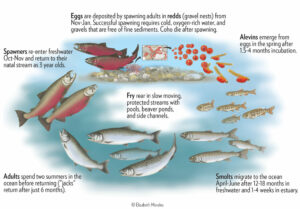Zoology

Population dynamics, movement, migration and colonization in fishes, spawning, feeding and over-wintering migrations
Thank you for reading. Don’t forget to subscribe & share! Population dynamics, movement, migration and colonization in fishes, spawning, feeding and over-wintering migrations Population dynamics, movement, migration and colonization in fishes, spawning, feeding and over-wintering migrationsFish populations are dynamic and
Thank you for reading. Don't forget to subscribe & share!
Fundamental links in life cycle of fishes, reproduction and development in fishes
Fishes, like many other animals, go through a fascinating life cycle that ensures the continuation of their species. The life cycle of fishes involves various stages, from reproduction and development to movement, migration, and colonization. Here are the fundamental links
Competition and predation in freshwater communities
Competition and predation are two fundamental ecological processes/ forces that play a major role in shaping the structure and dynamics of freshwater communities, shape freshwater communities, influencing species composition, population dynamics, and ecosystem structure. Here’s how competition and predation operate
Intra-specific relationships between fishes, bacteria, viruses, plants and other animals
Intra-specific relationships refer to interactions that occur within a single species. These relationships are essential components of ecosystems and play a significant role in shaping population dynamics, behavior, and community structure. Here’s how intra-specific relationships manifest among fishes, bacteria, viruses,
Biotic inter-relationships among fishes
Biotic inter-relationships among fishes refer to the various interactions that occur between different fish species within aquatic ecosystems. These interactions can be diverse and encompass a range of behaviors and relationships. Here are some examples:Thank you for reading. Don’t forget
Energy laws of thermodynamics, primary and secondary productions
Thermodynamics is the branch of science that deals with the transfer of energy, particularly heat, and its conversion into various forms. In the context of thermodynamics, there are several key concepts related to energy:Thank you for reading. Don’t forget to



